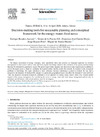Please use this identifier to cite or link to this item:
https://accedacris.ulpgc.es/handle/10553/105882
| DC Field | Value | Language |
|---|---|---|
| dc.contributor.author | Rosales Asensio, Enrique | en_US |
| dc.contributor.author | de la Puente-Gil, Álvaro | en_US |
| dc.contributor.author | García-Moya, Francisco-José | en_US |
| dc.contributor.author | Blanes-Peiró, Jorge | en_US |
| dc.contributor.author | de Simón-Martín, Miguel | en_US |
| dc.date.accessioned | 2021-03-18T09:27:44Z | - |
| dc.date.available | 2021-03-18T09:27:44Z | - |
| dc.date.issued | 2020 | en_US |
| dc.identifier.issn | 2352-4847 | en_US |
| dc.identifier.uri | https://accedacris.ulpgc.es/handle/10553/105882 | - |
| dc.description.abstract | The impact assessment of energy strategies, more specifically those that promote an integrated approach on resource management in other sectors such as water and food, requires knowledge related to the evaluation of the quality and knowledge that may be estimated by quantitative means. The present paper makes inquiries into those knowledge requirements in addition to review the means used to obtain it—including the required entries and the results they provide. In response to the recognized problems in knowledge, this paper introduces a basic reference structure underlying a system to evaluate the way that a progressive development of inexhaustible energies in a particular geographical region can affect the demand of water and food. Then, the proposed conceptual framework constitutes a novel approach for energy policy makers which only consider partial impacts of the energy management. By considering the nexus of energy, water and food, energy management policies may be redefined and differences with current policies must be investigated. | en_US |
| dc.language | eng | en_US |
| dc.relation.ispartof | Energy Reports | en_US |
| dc.source | Energy Reports [ISSN 2352-4847], n. 6, p. 4-15 | en_US |
| dc.subject | 332205 Fuentes no convencionales de energía | en_US |
| dc.subject.other | Energy strategies | en_US |
| dc.subject.other | Management of resources | en_US |
| dc.subject.other | Water, food and energy nexus | en_US |
| dc.subject.other | Renewable energy | en_US |
| dc.subject.other | Decision-making tools | en_US |
| dc.title | Decision-making tools for sustainable planning and conceptual framework for the energy–water–food nexus | en_US |
| dc.type | info:eu-repo/semantics/conferenceObject | en_US |
| dc.type | conferenceObject | en_US |
| dc.relation.conference | TMREE20 - EURACA | en_US |
| dc.identifier.doi | 10.1016/j.egyr.2020.08.020 | en_US |
| dc.investigacion | Ingeniería y Arquitectura | en_US |
| dc.type2 | Actas de congresos | en_US |
| dc.utils.revision | Sí | en_US |
| dc.identifier.ulpgc | No | en_US |
| dc.contributor.buulpgc | BU-ING | en_US |
| dc.description.sjr | 1,199 | |
| dc.description.jcr | 6,87 | |
| dc.description.sjrq | Q1 | |
| dc.description.jcrq | Q1 | |
| dc.description.scie | SCIE | |
| item.grantfulltext | open | - |
| item.fulltext | Con texto completo | - |
| crisitem.event.eventsstartdate | 25-06-2020 | - |
| crisitem.event.eventsenddate | 27-06-2020 | - |
| crisitem.author.dept | GIR Group for the Research on Renewable Energy Systems | - |
| crisitem.author.dept | Departamento de Ingeniería Eléctrica | - |
| crisitem.author.orcid | 0000-0003-4112-5259 | - |
| crisitem.author.parentorg | Departamento de Ingeniería Mecánica | - |
| crisitem.author.fullName | Rosales Asensio, Enrique | - |
| Appears in Collections: | Actas de congresos | |
WEB OF SCIENCETM
Citations
22
checked on Jun 8, 2025
Page view(s)
163
checked on Jan 11, 2025
Download(s)
143
checked on Jan 11, 2025
Google ScholarTM
Check
Altmetric
Share
Export metadata
Items in accedaCRIS are protected by copyright, with all rights reserved, unless otherwise indicated.
